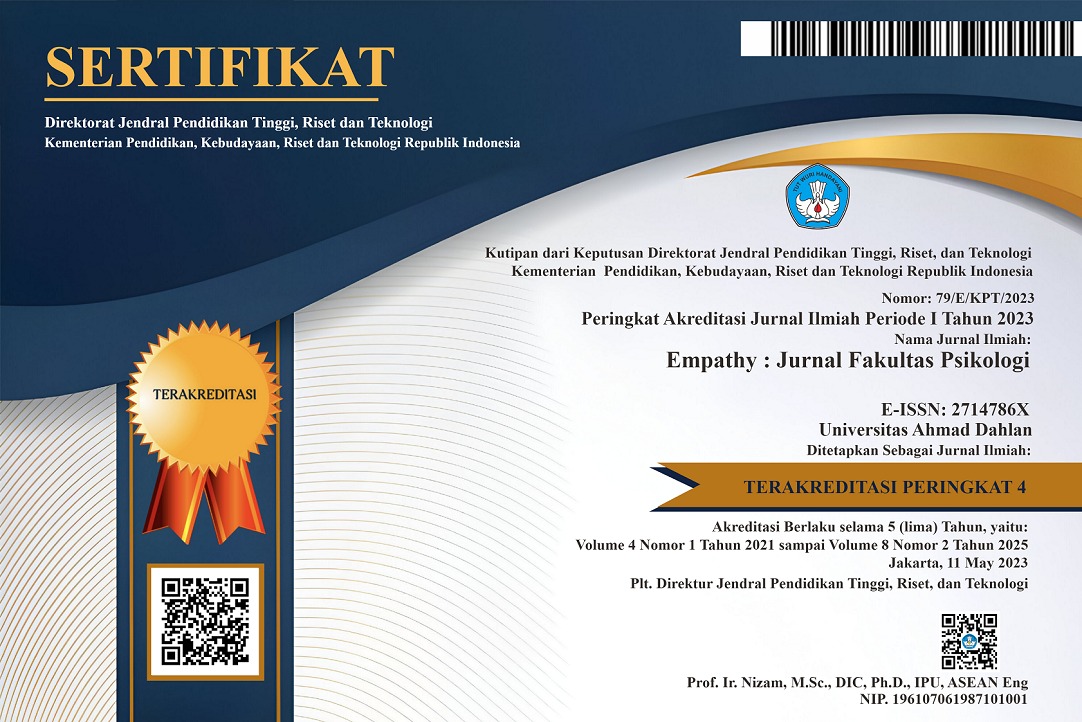Peningkatan Interaksi Sosial dengan Layanan Bimbingan Kelompok Menggunakan Media Zoom
DOI:
https://doi.org/10.12928/empathy.v4i2.21831Keywords:
Group guidance services, Social interaction, Zoom mediaAbstract
Increased Student Social Interaction with Group Guidance Services Using Zoom Media
Social interaction has become a serious problem nowadays, with the development of internet media today, students have interacted more with gadgets than interacting directly face to face with their friends. So the purpose of this study is to try to improve student social interaction through group guidance services using the zoom meeting application. This study uses an experimental approach with the type of one group pre-test post-test design with the student population of Madrasah Tsnawiyah Negeri 5 Kerinci, then the determination of research subjects is carried out with purposive sampling techniques taken from the results of pre-test with a total of 16 students. The data collection instrument uses Social Interaction Scale (SIS). Data that has been collected in the analysis descriptively and to see changes in students' social interaction before after being given group guidance services using Wilcoxon Signed Rank Test analysis. The results of this study revealed that group guidance services use effective zoom media to improve students' social interaction.References
Adam, Y. (2013). Meningkatkan Ketrampilan Sosial Melalui Bimbingan Kelompok Teknik Diskusi pada Siswa Kelas VIII Tsanawiyah Muhammadiyah Kabila Kabupaten Bone Bolango. (Skripsi, Universitas Negeri Gorontalo).
Alyusi, S. D. (2016). Media Sosial Interaksi, Idenntitas dan Modal Sosial. Jakarta: Kencana.
Astuti, D. T. (2013). Meningkatkan Kemampuan Interaksi Sosial Melalui Layanan Bimbingan Kelompok pada Siswa Program Akselerasi SD Hj.Istiati Baiturrahman 01 Semarang, (Skripsi, Universitas Negeri Semarang).
Burhanuddin, H. (2021). Optimalisasi Layanan Bimbingan Kelompok untuk Meningkatkan Kebiasaan Siswa Bertanya dalam Proses Pembelajaran di SMK Negeri 4 Gowa. Jurnal Paedagogy, 8(1), 57-66.
Dalyono, M. (2012). Psikologi Pendidikan, Jakarta: Rineka Cipta.
Darkonah, D. (2015). Bimbingan Kelompok untuk Meningkatkan Evikasi Diri Siswa SMPN 5 Satu Atap Tanjungan Brebes, (Skripsi, UIN SUKA).
Erlangga, E. (2017). Bimbingan Kelompok Meningkatkan Keterampilan Berkomunikasi Siswa. PSYMPATHIC: Jurnal Ilmiah Psikologi, 4(1), 149-156.
Haqien, D., & Rahman, A. A. (2020). Pemanfaatan zoom meeting untuk proses pembelajaran pada masa pandemi covid-19. SAP (Susunan Artikel Pendidikan), 5(1).
Hariyadi, S. (2012). Modul Video Sebagai Media Layanan Bimbingan dan Konseling, Yogyakarta: Deepublish.
Hasanah, A. (2021). Implementasi Model Pembelajaran Interaksi Sosial Untuk Meningkatkan Karakter Peserta Didik. Jurnal Pendidikan, 9 (1), 22-32.
Irmada, F., & Yatri, I. (2021). Keefektifan Pembelajaran Online Melalui Zoom Meeting di Masa Pandemi bagi Mahasiswa. Jurnal Basicedu, 5(4), 2423-2429.
Juju, J., & Sulianta, F. (2010). Hitam Putih Facebook. Jakarta: Elex Media Komputindo.
Juliawati, D., Yandri, H., Sujadi, E., & Ahmad, B. (2020). Pemantapan Tauhid Remaja Masjid Melalui Kegiatan Layanan Bimbingan Kelompok. E-Dimas: Jurnal Pengabdian kepada Masyarakat, 11(3), 323-329.
Latifah, L. (2020). Apa Itu Aplikasi Zoom? Alternatif Rapat Jarak Jauh, Begini Cara Kerjanya. Retrieved from: https://www.tribunnews.com/nasional/2020/03/18/apa-itu-aplikasi-zoom-alternatif-rapat-jarak-jauh-begini-cara-kerjanya.
Merrel, M. (2008). Keterampilan Sosial (Sosial Skill). Jakarta: Gramedia.
Norkhalifah, S. (2021). Pengaruh Pembatasan Interaksi Sosial di Masa Pandemi Covid-19 Pada Anak Usia Dini. Universitas Lambung Mangkurat. Banjarmasin, Kalimantan Selatan. Retriver from https://psyarxiv.com/
Prayitno. (2012). Jenis layanan dan Kegiatan Pendukung BK. Padang: UNP.
Putri, M. C., Juliawati, D., Khuryati, A., & Yandri, H. (2020). Mereduksi Perilaku Menyontek Siswa di Era “Merdeka Belajar†Melalui Layanan Bimbingan Kelompok. Jurnal Penelitian Bimbingan dan Konseling, 5(2).
Saputro, D. B. (2021). Layanan Bimbingan Kelompok Teknik Modeling Dalam Meningkatkanr Sikap Sopan Santun. Advice: Jurnal Bimbingan dan Konseling, 2(2), 132-145.
Sartika, M., & Yandri, H. (2019). Pengaruh layanan bimbingan kelompok terhadap konformitas teman sebaya. Indonesian Journal of Counseling and Development, 1(1), 9-17.
Sarwono, S. W., & Meinarno E. A. (2009). Psikologi Sosial. Depok: Salemba Humanika.
Soekanto, S (2010). Sosiologi Suatu Pengantar. Jakarta: Rajawali Press.
Sugiyono. (2012). Statistika Untuk Penelitian. Bandung: Alfabeta.
Suryani, L. (2017). Upaya Meningkatkan Sopan Santun Berbicara Dengan Teman Sebaya Melalui Bimbingan Kelompok. E-Jurnal Mitra Pendidikan, 1(1), 112-124.
Susilawati, S., Mustika, R. I., & Supriatna, E. (2021). Penerapan Layanan Bimbingan Kelompok dengan Teknik Self Instruction untuk Meningkatan Adversity Quotient Pada Siswa Underachiever. Fokus (Kajian Bimbingan & Konseling dalam Pendidikan), 4(1), 1-12.
Switri, E. (2018). Bimbingan Konseling Anak Usia Dini. Yogyakarta: Deepublish.
Ulandari, Y., & Juliawati, D. (2019). Pemanfaatan layanan bimbingan kelompok untuk meningkatkan kecerdasan emosi siswa. Indonesian Journal of Counseling and Development, 1(1), 1-8.
Wibowo, M. E. (2005). Konseling Kelompok Perkembangan. Semarang: UNNES Press.
Yandri, H., Harmalis, H., Sasferi, N., Naidarti, N., & Juliawati, D. (2021). Motivasi Instrinsik, Dukungan Sosial dan Prokrastinasi Akademik Mahasiswa Institut Agama Islam Negeri Kerinci. Jurnal Mahasiswa BK An-Nur: Berbeda, Bermakna, Mulia, 7(2), 24-31.
Yandri, H., Juliawati, D., & Musdizal, M. (2019). An Application of Group Guidance Service in Improving English Communication of Young Mosque Activist. GUIDENA Journal, 9(2), 51-56.
Yuniati, (2013). Meningkatkan Interaksi Siswa Melalui Layanan Bimbingan Kelompok dengan Teknik Permainan pada Siswa Kelas VII F SMP Negeri 13 Semarang Tahun Ajaran 2012-2013, (Skripsi, Universitas Negeri Semarang).
Downloads
Published
Issue
Section
License
Authors who publish with Empathy: Jurnal Fakultas Psikologi agree to the following terms:
- Authors retain copyright and grant the journal right of first publication with the work simultaneously licensed under a Creative Commons Attribution License (CC BY-SA 4.0) that allows others to share the work with an acknowledgment of the work's authorship and initial publication in this journal.
- Authors are able to enter into separate, additional contractual arrangements for the non-exclusive distribution of the journal's published version of the work (e.g., post it to an institutional repository or publish it in a book), with an acknowledgment of its initial publication in this journal.
- Authors are permitted and encouraged to post their work online (e.g., in institutional repositories or on their website) prior to and during the submission process, as it can lead to productive exchanges, as well as earlier and greater citation of published work.

This work is licensed under a Creative Commons Attribution-ShareAlike 4.0 International License.



